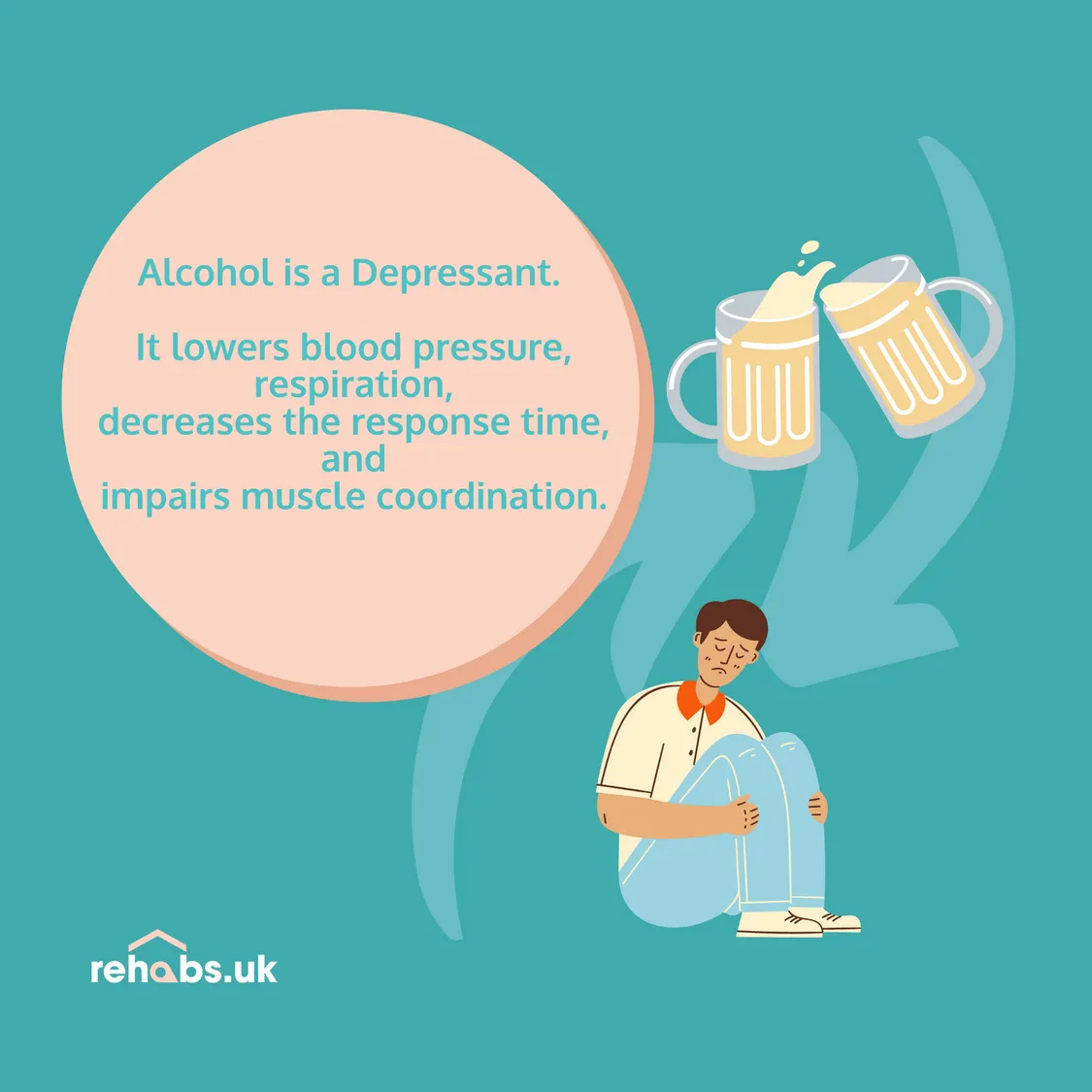13 Oct 2022
How can alcohol affect your mood?
Alcohol can have a huge impact on individuals’ mood. Everyone reacts differently when consuming alcohol. For some people while they are in the moment, it’s fun and has a positive effect. Some individuals go out partying at the w and ekend, others have a glass of wine to wind down after work.
Alcohol can have relaxing effects and can increase happiness for a period of time. However, for others it causes them to feel worse the next day or can result in a cycle of wanting to continue experiencing the feelings they have when consuming alcohol; which is a sign that may indicate alcohol dependence.
When alcohol consumption starts to impact someone’s daily life and routine it is time to seek help and guidance.
How does alcohol influence depression and mental health?
Depression and alcohol use can come hand-in-hand. It is very common that some people who suffer with depression disorder will use substances to help to combat symptoms. For example, using alcohol to help protect themselves from painful thoughts.
However, drinking alcohol in an unhealthy way can lead to suffering with depression symptoms such as sadness, hopelessness or lethargy and in extreme cases, alcohol can even lead to suicidal thoughts.
According to Drink Aware reducing or stopping drinking can improve your mood and mental health. In fact, people who are depressed often find that cutting out alcohol entirely for just four weeks makes a clear difference in how they feel.
According to the CDC 13% of U.S. adults reported starting or increasing their substance use to cope with stress or emotions related to COVID-19.
Alcohol can also influence depression and mental health. By consuming excessive amounts of alcohol, it can have a knock-on effect to the individual’s daily life and routine. It could start to affect work, school and relationships. When these start to deteriorate, symptoms of depression have usually either already started or begin to start within the individual.
Is alcohol a stimulant or a depressant?
It is widely recognised that alcohol is a depressant. It is mind altering and can change the balance of chemicals in the brain. Drinking heavily and regularly is associated with depression.
Alcohol directly affects brain chemistry by altering levels of neurotransmitters -- the chemical messengers that transmit the signals throughout the body that control thought processes, behaviour and emotion. Alcohol affects both "excitatory" neurotransmitters and "inhibitory" neurotransmitters.
Does alcohol lower serotonin?
Serotonin is a chemical in the body which is needed for memory, learning, and especially for feelings of ‘wellbeing’. Drinking alcohol can temporarily boost serotonin levels, therefore making you feel happier. However, in the long term, excess alcohol can actually lower serotonin levels, and as a result can either cause or exacerbate depression.
Rehabs UK Director, Lester Morse states, “Alcohol abuse coupled with the mental conditions causes induced depression. Alcohol abuse eventually starts suppressing the natural production of serotonin (hence the prescription drugs such as Seroxat). Dr Kevin McCauly, author of Pleasure Unwoven, describes this state as ‘pleasure deafness’.”
Does drinking worsen anxiety?
Most of us have experienced some sort of anxiety in our lives. This feeling can be intensified when drinking or after we consume alcohol.
The phrase ‘hangxiety’ has become popular in recent years. ‘Hangxiety’ describes the feeling of having anxiety after a night of drinking. Often people will have a ‘fear’ of what they did the night before. For example, they may dwell on if they embarrassed themselves, maybe they got too drunk or anxious about decisions they made while under the influence.
Hangovers can create a cycle of waking up feeling anxious, guilty, jittery and overall, just ill. More and more younger people are starting to reduce their drinking or go sober due to the severity of ‘hangxiety’.
If you are drink dependent you may need a medically monitored alcohol detox. Detoxing from alcohol can be dangerous and it’s important to know the risks that can occur before you quit.
What comes first, alcoholism or depression?
Neither alcoholism or depression come first. There isn’t one that is more dominant than the other. Each individual has their own genetic and chemical make-up. Someone can be affected by alcoholism and not by depression or vice-versa.
There are many factors which professionals take into account for someone who is susceptive to alcohol addiction or mental health problems. For example, environmental factors, genetic factors, psychological and brain chemistry.
However, many people do suffer with both. The Royal College of Psychiatrists recommend that for people who need help with both their drinking and depression, it’s usually best to tackle the alcohol first and then deal with the depression afterwards, if it hasn’t lifted after a few weeks.
What is dual diagnosis?
‘Dual diagnosis’ is the term when an individual has a combination of both a mental health disorder and a substance abuse disorder.
This can be quite common as one disorder can often trigger another. When a person is living with both of these illnesses then it may be more difficult to manage symptoms. It may also be difficult to find the right treatment and therapy for the individual to cater and support their daily needs.
If you want to learn more, we’ve written about the specifics of dual diagnosis and co-occurring disorders. Which includes how to find the right treatment for both mental health and addiction concerns.

Alcohol treatment options
There are several alcohol treatments available. It’s important to note that not everyone is the same and each individual's relationship with alcohol is different. No single or combined treatment may work for every person.
Treatment can include medication and a range of therapies including:
- Cognitive behavioural therapy (CBT)
- Group therapy
- As well as rehabilitation facilities
The addiction treatment process that is practised at Rehabs UK involves a free assessment with our Treatment Advisors to determine your needs. This could vary from home detoxing to residential rehab or online therapy. Whatever your circumstance we can help!
Our director, Lester Morse explains that “the 12-step programme, helps to understand the way you are and gives you a structured plan of how to live day-to-day. In some cases when individuals have completed a programme like that for an addiction the effects of that have helped to lessen symptoms of mental health without the prescription drug from the doctors.”
In total, according to the NHS, 50.8% of people who completed a course of therapy treatment recovered in 2017-18, up from 49.3% in 2016-17 and 46.3% in 2015-162. A total of 66.4% of patients showed reliable improvement after undergoing psychological therapy.
At Rehabs UK, we believe that the key to our success is our unique understanding of alcohol addiction and the effects it has on the human brain. Due to this life-saving knowledge we can help people to better understand the grave nature of their addiction and how to enjoy a full recovery.
Medication for alcohol dependence or depression
Medication can be prescribed for both alcohol dependence and depression. These aim to ease individuals’ withdrawal symptoms.
Anti-depressants can be prescribed to help balance mood. It is important to note that although medication can be beneficial for some individuals they should only be used in combination with other treatments and therapies.
Rehabs UK would advise talking therapies as the first treatment option before medication as sometimes medical professionals can misdiagnose mental health conditions. But remember, it is important to consult and follow the advice of your doctor or GP.
Cognitive behavioural therapy for alcohol
Cognitive behavioural therapy (CBT) is one of the most popular therapy options available. It is a practice used within the NHS and private sector. It can be used in combination with residential rehab as well as therapy alone.
CBT is a type of psychotherapy which aims to replace negative thoughts with a more positive outlook on life scenarios. This type of therapy allows individuals to spot certain potential triggers and find coping mechanisms to deal with urges to drink.
For more information about cognitive behavioural therapy such as how it works with different addictions, what to expect from CBT treatment as well as the benefits of using this type of treatment please visit our dedicated page.
Group therapy
Group therapy is another popular and successful treatment option. For those struggling with addiction, group therapy is often combined with one-to-one therapies to offer the best support and chance of successful recovery.
It can be used to engage and facilitate discussion among others in a similar position. Group therapy offers a safe space to openly discuss the highs and lows of their addiction. They can comment and give advice to other members in the group as well as from the facilitator.
There are many factors as to why group therapy is so effective
- It is a natural way to overcome a problem. Humans are social by nature and tend to build or grow with others around them, whether that’s at work or as a family. Therapy can be the same.
- Others within the group can support you and help you set and achieve your goals to recovery.
- It opens your mind to new ways of thinking. You are able to try these out in a safe space before taking what you’ve learned out in the real world.
- Other members of the session may be having the same challenges as you. It allows you to view the challenges you face by viewing them through someone else’s perspective or experience.
Unsure what to expect from group therapy? More informationon our specialist page.
Group therapy is a key therapy used within the popular 12-step programme approach to recovery. To learn more about the 12-step programme, including, how it works and what addictions can be helped by the programme visit our dedicated page.
Rehab
Rehab (whether residential or out-patient rehab) can be the right treatment for those who may be heavier users of alcohol. This option offers 24/7 support and treatment therapies combined. It will also include a medical detox before a tailored treatment plan is created.
Discover more specifics about alcohol rehab, including what’s involved, what to expect and the benefits of treatment on our dedicated page.
For more about our rehabilitation facilities visit our rehab locations page. Whether you are looking for somewhere close to home or further afield, explore your options today.
Most importantly, don’t wait before reaching out for support. We’re here to help you, whatever addiction you’re facing. Get in touch with our specialist addiction support team today.
